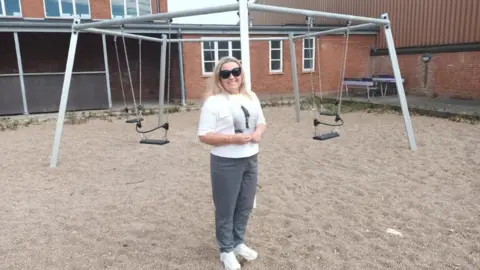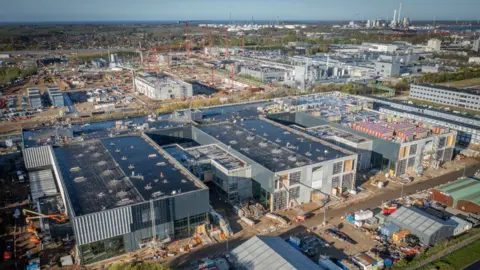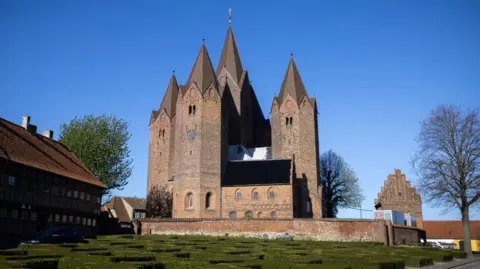 BBC
BBCKalundborg, a town of just 16,000 people on the Danish coast about an hour’s drive from Copenhagen, is as close as you might get to a modern-day gold rush town.
It’s the main production centre for weight loss drug Wegovy. Semaglutide, used in Wegovy and diabetes drug Ozempic, is made in a factory here, and parent company Novo Nordisk has invested more than $8.5 billion (£6.5bn) in the town. That’s nearly the entire GDP of Monaco.
But persuading people to actually live in the town could prove tricky.
There’s an influx of workers and builders at the factory in the morning and an exodus in the afternoon – locals call it the “Novo Queue” and recommend avoiding the town’s road for these hours each day.
Hardly any of the workers stay – they live outside and drive in.
So when there’s £400,000 of investment per resident, what’s there not to like?
Behind the rosy figures, Kalundborg faces many challenges, from rundown schools and low incomes to many children being overweight.
State school grades in Danish language and maths here are below the national average. Some on the town’s periphery have few facilities inside or out, with just old swings in the playground.

“If you saw that, you will take one of the big cities around here and say, ‘Well, we will live there and then I can drive to Kalundborg to work,'” regional councillor Helle Laursen Petersen tells me.
She says these schools are struggling to attract experienced teachers, helping to fuel low expectations among many parents.
After all, she says, they think their children will always get a job at the Novo Nordisk factory, so why bother trying to get to university?
Ali, Anna K, Anna and Marie at Gymnasium, the most academic secondary school in the area, tell me they want to leave to study.
“It might become interesting later, but as of now, I think it’s a bit too boring to settle down here – I think I’d like a larger city,” Anna K says.
But Ali and Marie are more excited about coming back after their studies, hopeful of more job opportunities in the town so they can enjoy its natural beauty more.
Problems – and hope
 Getty Images
Getty ImagesMeanwhile Brian Sonder Anderson, who runs the Blue Angel cinema and is head of the local trader’s association, points out that supermarkets and bakeries are booming locally as factory workers flock to them on their lunch breaks.
But other shops, such as those selling shoes and clothes, quickly open then shut down again because of the amount of workers living elsewhere.
Many families on low incomes live here, priced out of the capital Copenhagen where rents and property prices have soared – leaving some on benefits and others relying on work at the factory.
Kalundborg also has a health problem – it’s in the highest 5% of Danish towns for children being overweight.
Novo Nordisk, meanwhile, is now Europe’s most valuable company with a revenue last year of more than $33bn – bringing its market value to more than $500bn.
Investment in the town aims to add 1,250 jobs to the existing 4,500 employees at the Kalundborg plant and ramp up production of its best-selling drugs. While the company represents about 1% of the Danish workforce, it accounts for a more sizeable proportion of its growth.
Denmark’s economic growth was 1.1% over the first nine months of 2023. But strip away the pharmaceutical sector, dominated by Novo, and the economy shrank by 0.8%. Some analysts have warned that parts of the country’s economy risks becoming too reliant on the pharmaceutical industry.
The town’s mayor Martin Damm is upbeat, insisting that more than 1,000 new jobs are being created here every year and some young people are happy to call it home.
“In Europe people are moving from the rural area into the big cities and this is going the opposite way,” he says.
“This is the little city [that] attracts big investment.”

He also insists that schools are being refurbished or already have good facilities – and that rising prosperity will, in time, lead to healthier lifestyles.
Miguel, an 18-year-old student from Madrid studying bio-technology on one of the new university courses in the town, has just joined a local football team with players from Brazil, Mexico, Poland and Ukraine.
“There’s so many international people in this town and almost everyone that I’ve talked to in English has responded in English,” he says.
Amanda, from Brazil, insists opportunities are here – she’s landed a job, placed her two young children in a local school and hopes that they’ll stay here for university.
 Getty Images
Getty ImagesA new highway is also being built to help ease the town’s chronic congestion – but getting people to live here will be the real fix for that.
Students at the Gymnasium think the town is at something of a crossroads.
“In five years, I think the town [will have] grown quite a lot – I hope for a multi multicultural town,” says Anna K.
“If that is so, then I might consider moving back.”



